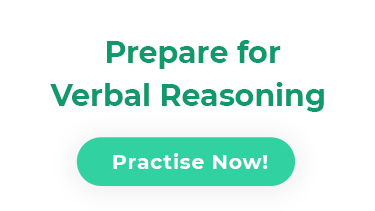A verbal critical reasoning test will push your limits and challenge your intellect. As opposed to a standard verbal comprehension test, these pre-employment aptitude tests will force you to analyse not only the content of the text, but the writer’s assumptions and logic as well. If you’re applying for a job that requires you to analyse complex arguments and develop informed opinions, you might be asked to take an online psychometric assessment of this sort. Read through our brief description below and then click over to the second tab for a couple free sample questions.
What Are Verbal Critical Reasoning Tests?
On a standard reading comprehension or grammar exam, you’ll be asked to answer questions about passages you’ve read. You might also have to correct grammatical errors, define vocabulary words, and correct poor word choice. Most of these questions deal with technical matters. While these questions might ask you about the author’s intention or the passage’s conclusion, it won’t ask you to analyse the argument itself.
On a verbal critical reasoning test, graduates and job-seekers should analyse the argument logically. You’ll need to contest false assumptions, evaluate the strength of a conclusion, and identify possible objections. Not only will you have to thoroughly understand the content of the argument, but you’ll have to deconstruct it as well.
How to Prepare for a Verbal Critical Reasoning Test?
If you need to take a verbal critical reasoning exam, you’ll want to make sure you practice ahead of time. Critical reasoning tests can seem pretty daunting if you haven’t come across anything similar before; however, if you train yourself to identify various components of an argument, you’ll be able to answer the questions more efficiently. Here are basic terms you should be able to recognise:
- Premise: A premise is a stated fact upon which a writer will base his conclusion. In most cases there are at least two premises.
- Assumption: An assumption is an unstated belief the author holds that will influence his argument.
- Conclusion: A conclusion is an argument’s final statement. It is the opinion the author forms based on the facts presented to him in the premises.
- Inference: An inference is a conjecture one might make based on the conclusion.
Verbal Critical Reasoning Tips:
Verbal critical reasoning tests are certainly not easy. However, with a bit of practice and some expert advice, you’ll head into the assessment centre confidently.
- Remain Unbiased- It can be easy to assume that the writer or the speaker holds your beliefs. However, make a conscious effort to clear your mind of any unconscious bias or pre-conceived notions. You want to make sure you’re analysing the writer’s argument and not creating your own.
- Ask Why- Instead of thinking about whether the author is right or wrong, ask yourself why the author thinks what she does. Remember, your goal is to assess her logic, not her opinions. You may disagree with her, and that’s fine. However, make sure you stay focused on the task at hand.
- Correlation not Causation- Watch out for common logical fallacies. Just because two phenomena happen at the same time does not mean they’re necessarily connected. They may be related, but it is presumptuous to assume that one causes the other without explicit proof.
Final Thoughts on Verbal Critical Reasoning Tests:
Verbal critical reasoning tests are by no means simple. If you’ve only taken standard reading comprehension or writing exams in the past, you’ll be in for a surprise. Much closer to the LSAT’s than the SAT’s, this aptitude assessment will force you to think logically and analytically. Make sure to click over to the questions tab to try your hand at a few questions now.

